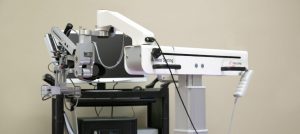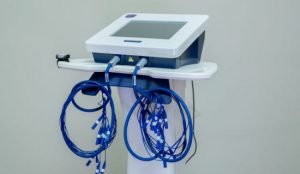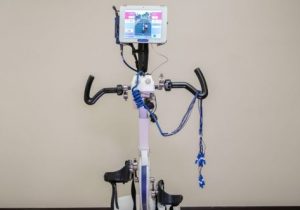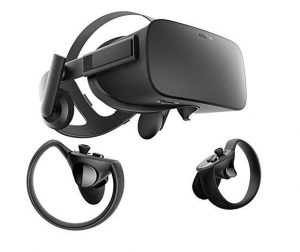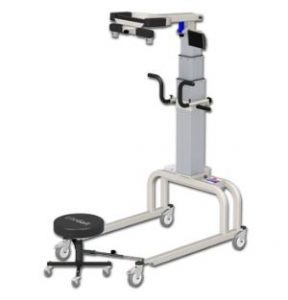How is inpatient rehabilitation different from a skilled nursing facility?
The differences between inpatient rehabilitation and a skilled nursing facility are the level of medical care, the coordination of care and the intensity of rehab therapies offered. Patients in an inpatient rehabilitation facility are seen by the physicians daily, the nurse to patient ratio is the same as in the acute care hospital and each patient has a weekly meeting to set goals and plan for the return home. Regardless of your specific needs, you can rest assured that an entire team of specialists will work together to create a care plan that caters to your goals and your needs, so that you can get back to what you love most as quickly as possible.
What will my day be like?
Each patient has an individualized, planned pathway to recovery and receive a minimum of three hours of therapy a day. Generally, therapy treatments begin after breakfast and continues to lunch, Monday through Friday. Afternoon therapy treatment continues until approximately 4:00 pm. During evenings and on the weekends, patients have time for resting, visiting with friends and family, watching TV, reading, etc.
What should I bring with me?
- Patients are advised to bring a list of their medications, but please do not bring medications from home, unless otherwise requested. This policy assures safety for all patients due to possible incompatibility of certain medications, vitamins and supplements.
- Dentures with adhesive, hearing aids with batteries, eyeglasses or contact lenses, if needed.
- Patients are encouraged to bring personal items such as pictures, reading materials, leisure time items, laptop computers, iPod or MP3 players and/or portable CD/DVD players.
- 3 to 5 outfits including sweatpants or shorts, t-shirt, sweater or jacket, shoes (closed heels and rubber soles), undergarments and belts.
- Patients do not need to bring any equipment such as walkers, canes or wheelchairs. We will provide for any specialized needs the patient may have while in our care.
What are the visiting hours?
Family and friends who will be providing care to you after discharge are highly encouraged to attend and participate in therapy sessions throughout your stay for family training and education. For those visitors who will not be a caregiver following discharge, we encourage you to visit between 3:30 pm and 8:00 pm, to avoid interrupting therapy schedules. Children are welcome to visit but must be under adult supervision at all times. Due to the dietary restrictions of many of our patients, please check with nursing staff before bringing outside food into the hospital.
Can my family stay with me overnight?
Yes, this is generally arranged prior to admission through the nurse liaison. One guest over the age of 18 will be a primary caregiver, able to care for themselves and participate in learning patient care. Overnight visitors will be issued an “Overnight Visitor” badge and will be able to use the fold out sofas available in most rooms for their convenience and comfort.
When are meals served?
Meals are served in your room or scheduled with therapists and served in day rooms or the therapy gym. Traditional meal times are 7:30 am, 12:15 pm and 5:00 pm. Food and drinks from home may be allowed. Please check with your nurse and speech therapist for restrictions. Nursing aids collect meal selections as circled on your ticket. Meals are ordered one day in advance. Standard meals come the first two days of your rehabilitation stay and pantry items are available for patients to prepare in their rooms.
When will I find out my discharge date?
You will know your anticipated discharge date after your first team conference. However, your discharge date can change if circumstances or progress changes.
What if I need medical equipment after I am discharged?
Your primary physical therapist and occupational therapist will coordinate any medical equipment you may need upon discharge. Our Durable Medical Equipment Coordinator, your therapists, case manager or the DME company will let you know if there are any out of pocket costs which must be paid at time of delivery. Typically equipment is delivered to your room the day before discharge.
What are the expectations of caregivers?
Caregivers are expected to attend and encouraged to participate in patient care. Some tasks will require caregiver training first. The earlier caregiver training begins, the better prepared they will be at the time of discharge.
Can my service dog stay with me?
If appropriate paperwork is provided service dogs are permitted. You are responsible for the care of your service dog while in the Center for Inpatient Rehabilitation.
Am I allowed to leave the Center for Inpatient Rehabilitation with a caregiver?
Upon approval from your physician, you are permitted to visit other designated areas of the hospital. Before leaving the unit you will be required to sign out at the nursing secretary’s desk so that physicians and staff know where to find you if needed.
Do you have a map of the campus?
Halifax Health | Brooks Rehabilitation Map

